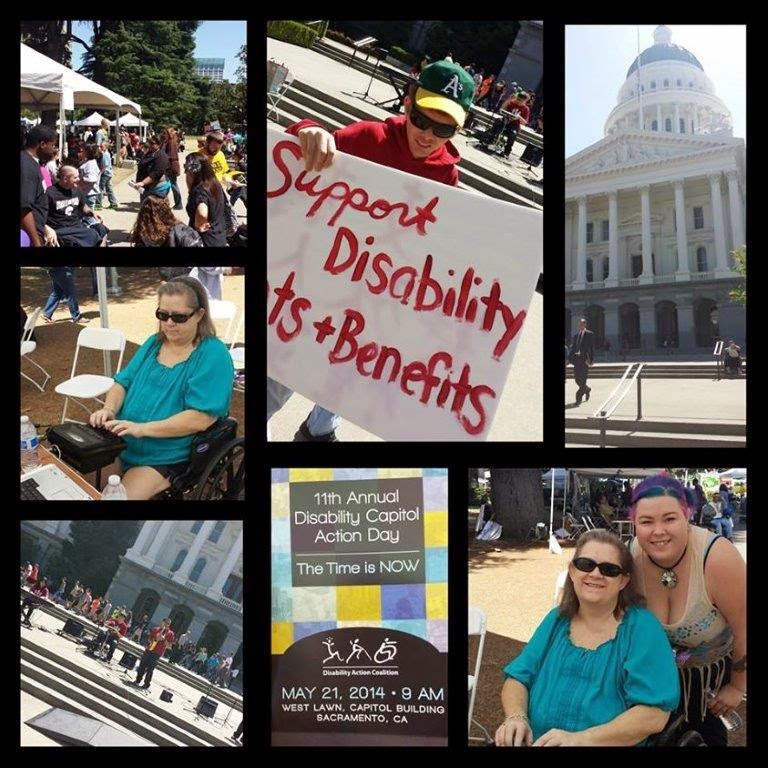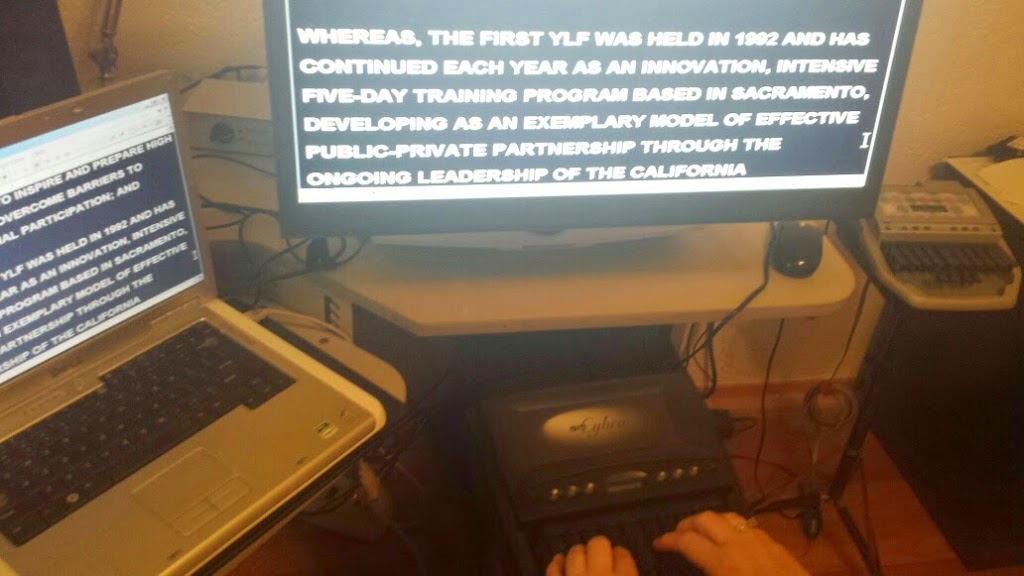By Rhett Simmons of West Coast Captioning
Assistive Technology (AT) has been a major part of my life for the last 23 years.
In 1991, I started using AT to provide captioning services for Deaf and Hard of Hearing individuals. In case you don’t know, captioning is the black box with words in it that you see on the television screen when you are at the gym or in a restaurant. So, even if you can’t hear the sound, you can read the captioning which puts the English words being spoken in the box. Without AT, this would not be possible. Sometimes captioning is broadcast over television and sometimes it is provided live at events or in classrooms. Now, we can also even provide remote captioning through the internet. Our agency provides all these services, and we use AT for all of them.
In the beginning as captioning was just coming to the forefront, software was developed to allow the key strokes from a steno machine (typically used by court reporters) to be recognized as English words. Those words were then projected to a computer screen which allowed the Deaf or Hard of Hearing individual to have communication access to whatever setting they may be in. With the advancement of the captioning software and the use of a computerized steno machine and a laptop, students could then be interactive in their university courses or in work meetings – which they had not been able to do previously. This AT was a huge advancement for the community.
U.C. Davis wanted to try this cutting-edge technology, and they set up a pilot program. I was the captioner that was contracted to provide services for this pilot. Fortunately, the pilot program was a success! After that I started my captioning agency, West Coast Captioning. We started out in colleges and universities providing educational captioning, but as requests grew, the agency grew as well. It has been exciting to see how AT technology has changed over the years. With each change, we can provide better services with easier access for our consumers. Being located in a capital city (Sacramento), our agency has evolved to specialize in governmental captioning. We also have captioners on staff who specialize in various other areas.
 |
| Rhett providing captioning at DCAD 2014 – Rhett and her daughter are in the bottom right |
Over the last two years, AT has taken a different role in my life. I am a diabetic and now legally blind. I was diagnosed with gestational diabetes at the age of 28. After the birth of my daughter, the diabetes went away. But, at the age of 35, it returned and I was diagnosed with type 2 diabetes. Years later, diabetic complications started and have not stopped. At the age of 48, I had a stroke. At 50, I developed congestive heart failure and kidney problems, both of which have made Kaiser South Sacramento Hospital my home away from home. At 52, I was declared legally blind. I am now 54, and this – being legally blind – is the complication that I have struggled with the most.
As a captioner, it is so important to be able to read what you are captioning so that you can correct errors and have the captioning be as near to perfect as possible. Well, obviously without vision that can’t be done – at least not done in the way I had been accustomed to doing it for 21 years – or so I thought. Miraculously, the good news is that I am STILL doing my job. Unbelievable, huh?
With the help of the AT, I have been able to continue captioning. Has it been difficult? Absolutely. Has it required a lot of flexibility and change? Yes, it has. But I am doing it!
 |
| Rhett’s two captioning screens |
I still use the same captioning equipment I always have, but I now have a large (and I mean LARGE) screen attached to my computer. With specialized software for individuals that have low vision or are blind, I am able to enlarge the captioning I am doing on the larger screen while the captioning on the smaller screen stays the same. It is a miracle that, with the enlarged font and the inverted colors, I am able to see the words.
With my agency, I also have a lot of office work. I currently use a CCTV to help me read my mail, sign pay checks, pay bills, and do invoicing. I didn’t even know about CCTVs until I became blind. This is something that can oftentimes be found in the AT Network Device Lending Library to borrow, should anyone wish to try it out themselves. I can no longer read text such as mail, books, or anything printed but the CCTV allows me to continue to see those things. It is the most amazing piece of AT that I use. I also have a portable CCTV that fits in my purse. I can take this to a restaurant and read the menu. Without this assistive technology, I would not have been able to continue to work or continue to do the many things that running an agency requires.
What I am particularly thankful for is the fact that going into the field of captioning has allowed me to be exposed to the disability community. This has made my new journey so much easier. I have several blind friends that have inspired me with their professional and personal success and the way they live their lives. At times, I felt like giving up, as I got so weary. During those times, someone always came through to help lead me through it. It has been hard and I have changed a lot.
I think being willing to change is the key here. The best advice came from a wonderful friend of mine, who also has vision loss. She said to me, “Rhett, if you are willing to do things differently, you are going to be fine. Step out of the box and be open to change.”
Since then, several people have given me that same advice and this is where the AT comes in. I always go back to that solid advice when I feel defeated. I do things very differently now than I did just two years ago. I am sure that in two years from now I will be doing things differently again. I feel so fortunate to live in a time when AT is here to help me with these changes. If this had happened even 20 years ago, I would have had to quit. Perhaps someday I will reach that point, but it won’t be because of this disability. It will be because I am getting too old and it is time to retire.
And actually, being blind is not all bad. At first I thought it was but now that I have settled in a bit, I am finding more and more good things about it. Yes, it is sad that I cannot see my daughter’s beautiful smile anymore. But on the flip side, she is apparently dying her hair every color of the rainbow right now and that, in particular, is a thing this mom doesn’t need to see – I’m good. Just sayin’…




